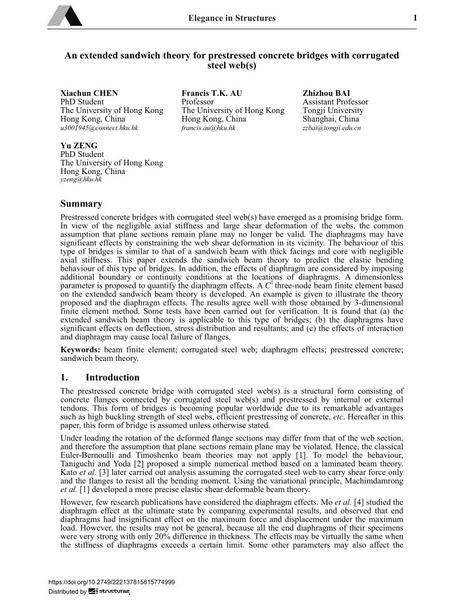An extended sandwich theory for prestressed concrete bridges with corrugated steel web(s)

|
|
|||||||||||
Détails bibliographiques
| Auteur(s): |
Xiachun Chen
Francis T. K. Au Zhizhou Bai Yu Zeng |
||||
|---|---|---|---|---|---|
| Médium: | papier de conférence | ||||
| Langue(s): | anglais | ||||
| Conférence: | IABSE Conference: Elegance in structures, Nara, Japan, 13-15 May 2015 | ||||
| Publié dans: | IABSE Conference Nara 2015 | ||||
|
|||||
| Page(s): | 270-271 | ||||
| Nombre total de pages (du PDF): | 8 | ||||
| Année: | 2015 | ||||
| DOI: | 10.2749/222137815815774999 | ||||
| Abstrait: |
Prestressed concrete bridges with corrugated steel web(s) have emerged as a promising bridge form. In view of the negligible axial stiffness and large shear deformation of the webs, the common assumption that plane sections remain plane may no longer be valid. The diaphragms may have significant effects by constraining the web shear deformation in its vicinity. The behaviour of this type of bridges is similar to that of a sandwich beam with thick facings and core with negligible axial stiffness. This paper extends the sandwich beam theory to predict the elastic bending behaviour of this type of bridges. In addition, the effects of diaphragm are considered by imposing additional boundary or continuity conditions at the locations of diaphragms. A dimensionless parameter is proposed to quantify the diaphragm effects. A C1 three-node beam finite element based on the extended sandwich beam theory is developed. An example is given to illustrate the theory proposed and the diaphragm effects. The results agree well with those obtained by 3-dimensional finite element method. Some tests have been carried out for verification. It is found that (a) the extended sandwich beam theory is applicable to this type of bridges; (b) the diaphragms have significant effects on deflection, stress distribution and resultants; and (c) the effects of interaction and diaphragm may cause local failure of flanges. |
||||

